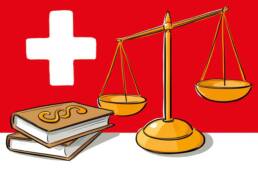The four themes on the Swiss referendum on February 13, 2022
The Swiss people will decide on tobacco advertising for young people, a ban on animal testing, stamp duty and press subsidies
On February 13, the Swiss people will vote on four issues: the initiative “Yes to the protection of children and adolescents from tobacco advertising”, the amendment of the Federal Stamp Tax Act, the initiative “Yes to the prohibition of experiments on animals and humans” and the Federal Act on a package of measures in favor of the media.
Initiative “Yes to the protection of children and adolescents from tobacco advertising”
Today in Switzerland, advertising for tobacco products is allowed within certain limits. Tobacco advertising on radio and television, as well as advertising targeted at minors, is prohibited. Most cantons have introduced stricter restrictions, such as advertising on posters and in cinemas.
The initiative calls for a complete ban on tobacco advertising where children and adolescents might see it, such as in the press, on posters, on the Internet, in cinemas, kiosks or at events.
The same rules would also apply to e-cigarettes. Advertising intended exclusively for adults or in places not accessible to minors would remain permitted.
The Federal Council and Parliament are opposing the initiative with the new Tobacco Products Act as an indirect counter-proposal, which aims to introduce a ban on advertising tobacco products and e-cigarettes on posters and in cinemas.
The ban also covers the free delivery of cigarettes and the sponsoring of international events by tobacco companies.
The new law can enter into force regardless of the outcome of the vote on the popular initiative.
The question on the referendum
“Do you want to accept the popular initiative ‘Yes to the protection of children and adolescents from tobacco advertising’ (Children and adolescents without tobacco advertising)”?
No: Recommendation of the Federal Council and Parliament
The Federal Council and Parliament want to protect children and adolescents from the harmful effects of smoking. However, they believe that the initiative is too restrictive. The counter-proposal strengthens the protection of minors while continuing to authorize advertising to adults.
Yes: recommendation of the initiative committee
Through the initiative, the committee intends to ban all forms of advertising that reach minors. It believes that this is the only way to effectively protect young people. The counter-proposal still allows forms of advertising that can be accessed by children and adolescents and induce them to consume harmful tobacco and nicotine.
Modification of the Federal Stamp Duty Act
Businesses need capital, for example to make investments or offset losses. If a company increases its equity capital by issuing shares or similar, the federal government levies a tax: the issue tax.
This is levied on amounts from one million francs upwards and amounts to one percent of the capital thus acquired. As a rule, small companies do not pay this tax; the revenue generated comes mainly from medium-sized and large companies.
The Federal Council and Parliament intend to abolish the issue tax. Companies should be able to acquire new equity capital without being taxed.
This will reduce investment costs and have a positive effect on growth and jobs.
Young, fast-growing companies in particular, which have not yet built up reserves, will benefit from the abolition of the issue tax.
Their financing depends on the availability of additional equity capital, which is currently subject to the issue tax. For the Confederation, the abolition of the tax would lead to a loss of revenue estimated at CHF 250 million per year.
The question on the ballot
“Do you wish to accept the June 18, 2021 amendment to the Federal Stamp Tax Act (BST)?”
Yes: Recommendation of the Federal Council and Parliament
The Federal Council and Parliament intend to abolish the stamp duty. This will have a positive effect on the attractiveness of the Swiss financial centre: abolition generates growth and creates and secures jobs. In addition, it is a financially sustainable measure.
No: recommendation of the referendum committee
According to the committee, the main beneficiaries of the abolition of the emission tax are large multinationals, banks and insurance companies. On the contrary, they would have to pay more taxes or suffer cuts in state services.
Initiative “Yes to a ban on animal and human experiments”
Animal experiments are allowed in Switzerland. They allow the development of drugs and therapies with which to improve the treatment of diseases. Switzerland has one of the strictest animal testing laws in the world.
Researchers are only allowed to use the number of animals strictly necessary, taking care to cause them as little suffering as possible.
The initiative aims to ban both animal experiments and the import of products developed using such experiments.
It also demands that research carried out without animals should receive at least the same level of government support as is currently granted to research using them. Finally, it also calls for a ban on human experiments.
If the initiative were to be accepted, new drugs developed using animal experiments would no longer be available in Switzerland.
In addition, research and development of medicines and products such as plant protection products would have to be scaled down and possibly transferred abroad.
The question on the ballot
“Do you want to accept the popular initiative ‘Yes to a ban on animal and human experiments’ -‘Yes to research approaches that promote safety and progress'”?
No: Recommendation of the Federal Council and Parliament
For the Federal Council and Parliament, a ban on animal experiments would have considerable disadvantages for Switzerland. It would prevent humans and animals from benefiting from a large number of new medical therapies, would severely restrict research and development activities and would threaten jobs.
Yes: Recommendation of the initiative committee
For the committee it is not permissible to conduct experiments abusing animals and people who are unable to express their will. No animal or human being can provide reliable predictions for another living being. Researchers could also achieve the desired results with approaches that do not involve suffering.
Federal law on a package of measures for the media
Newspapers, private radio and television stations as well as online media inform the population every day about what is happening in their region and in Switzerland. In this way they contribute to political opinion-forming and social cohesion.
In spite of their importance, local and regional media are experiencing financial difficulties: advertising revenues are increasingly flowing into the coffers of large international internet platforms. Many publications have disappeared and the advertising revenues of private radio and television stations are also declining.
The Federal Council and Parliament want to strengthen local and regional media. For some time now, the federal government has been reducing the cost of distributing subscription newspapers.
The aim is to extend this reduction to newspapers with higher circulation and to morning distribution, to promote online media and to grant local and regional radio and television stations more support, provided that they are primarily aimed at a Swiss audience and cover a wide range of political, economic and social topics.
The promotion measures are to be financed from the broadcasting licence fee and from federal funds.
The question on the ballot
“Do you want to accept the Federal Law of June 18, 2021 on a package of measures in favor of the media?”
Yes: Recommendation of the Federal Council and Parliament
The Federal Council and Parliament want to prevent further publications from disappearing or private radio stations from going out of business by giving greater support to the media. This is the only way to ensure that information in all regions, an important service for the population and direct democracy, can continue to be guaranteed in the future.
No: recommendation of the referendum committee
According to the referendum committee, the planned media support is a waste of taxpayers’ money, from which rich publishing houses profit.
According to the committee, subsidized media become state media. The direct democracy of Switzerland needs independent media.







